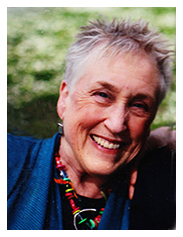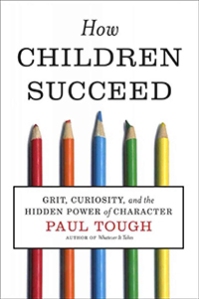 Vicky Kelman
Vicky Kelman
How Children Succeed: Grit, Curiousity, and the Hidden Power of Character by Paul Tough
How do children succeed?
and
What is success?
The premise of this book is that whereas, the American education system has been based on cognitive ability and academic achievement as the basis for “success,” in fact, research reveals that there are a set of character strengths (specifically the traits of grit, zest, self-control, social intelligence, gratitude, optimism, curiousity) that are far more important and far more predictive of success.
 It’s an interesting list. I would be more inclined to think of zest and optimism as inborn aspects of temperament but apparently they, too can be developed, encouraged and grown.
It’s an interesting list. I would be more inclined to think of zest and optimism as inborn aspects of temperament but apparently they, too can be developed, encouraged and grown.
Tough’s work is focused on schools (public and private) and he zeroes in on those pioneering educators who are consciously working to develop these character strengths particularly in children growing up in the shadow of poverty and limited expectations. He believes that these traits that will open doors for this subset of students, and may even give them a kind of head-start over more priveleged age-mates whose years have been devoted to academic achievement at the cost of these character strengths.
Tough distinguishes between the realm of what we know as ‘character education,’ embodying values like fairness, generousity and integrity and those that address ‘performance character’ which includes values like effort, diligence and perseverance…..the strengths …while they do have a moral component, strengths like zest, optimism, social intelligence and curiousity aren’t particularly heroic; they make you think of Steve Jobs or Bill Clinton more than Martin Luther King, Jr or Gandhi.” (p 78)
It could be easy to read this book and think: well it’s interesting but it’s not about “our” kids. And Tough points to this — he finds it a challenge to persuade parents of kids in a “posh” private school that there might be a “benefit” to their kids in developing his list of character strengths, whereas to parents of inner-city kids, the idea that character can get them to and through college was “a very powerful lure.” (p 80)
I found myself wondering, what does this say to us as Jewish educators and as Jewish parents raising Jewish kids. If the definition of success for Tough is getting into and completing college (something most people reading this will sign on to) — what is success? Is there a Jewish definition of success?
What came to mind for me was the blessing invoked when we name a baby. After all, what could be more revealing of our idea of success than the dreams we set forth for a new baby.
“May his/her parents raise her to Torah. Huppah and Ma’asim Tovim”
Torah: study of Torah, a life embued with Torah and learning
Huppah ( literally, the marriage canopy) marriage, love, sustaining personal relationships
Ma’asim Tovim ( literally, good deads) a life characterized by the doing of good deeds
In Jewish tradition, these are the three ingredients of a “successful” life. If our kids acquire these in their journey toward adulthood and live a life defined by these, then they are “successful,” in the eyes of tradition.
I don’t think it is too much of a stretch to weave together Tough’s seven traits with this traditional Jewish matrix.
Certainly we have a tradition that values (to give a few examples):
- gratitude ( the whole berakha system) woven into everyday life;
- self-control is built into many aspects of Jewish life from waiting for haMotzi before “digging in,” the whole system of kashrut, returning a found object to its owner
- zest: building a sukkah, dancing at a wedding, naming a baby
- curiousity: our whole system of questioning our texts, of commentary, of Talmudic inquiriy
- grit: mustering the energy it takes to begin to build a sukkah right after fasting all day for Yom Kippur, sticking out the process it takes to learn to read Hebrew or read Torah or lead Havdallah, following through on the commitment to show up for the meal at the shelter or prepare a body for burial
- social intelligence: the concept of minyan, the value of community, bikkur holim (visiting the sick). feeding the hungry, doing teshuva
- optimism: our engagement in tikkun olam (repairing the world)
Wendy Mogel, (Blessing of a Skinned Knee, Blessing of a B-) writes about “the blessing of longing,” about learning to defer satisfaction, about teaching our kids the difference between “need’ and “want,” about becoming a citizen of the family, about the impportance of chores (work) tackling tough tasks , skinned knees and about parents’ roles in providing a counter-culture to the world of entitlement and materialism right outside our door.
“College deans use the code word ‘teacups’ for incoming students who are overprotected and fragile. When presented with a challenge, teaccups don’t rise to it. They crack…If we want to raise young adults who know how to solve probems , we must let them have problems to solve while they are adolescents.” (Blessing of a B-, pp 95-6)
Madeline Levine (The Price of Privelege, Teach Your children Well), is a Bay Area psychologist who specializes in teens and works with many kids whom we would recognize:
She provides a list of seven essential “coping skills” that she thinks matter most: resourcefulness, enthusiasm,creativity, a good work ethic, self-control, self-esteem, self-efficacy, (Teach Your Children Well, chs 6 and 7) Remarkably like Tough’s aren’t they?
She asks us, “How much more effort do most of put into “smart” as opposed to “good.” I have yet to hear of tutors hired to raise a child’s character….
These writers’ approaches compliment Tough’s approach. He is concerned that children emerging from poverty develop the strengths that are prerequisite (or concommitant) to learning and achievement. Mogel and Levine look at the flip side — they are concerned with the debits of privelege and entitlement: too much over concern about academic achievement, too much oversight, too much protection, producing all those teacups and the college applicants whom college admissions counselors call “failure deprived.” (Levine, ch 5) Tough’s kids have had too many “skinned knees.” The kids Mogel and Levine are concerned with haven’t been allowed to have any.
In a recent article in Tablet Mag Marjorie Ingall* writes about her daughter’s (public) school experience with a teacher “obsessed” (in a good way) by Paul Tough’s approach to education. She writes, “Do not drey to me that you hate this culture of materialism and narcissism and test-score-obsession, but this is our culture and yes, it sucks, but you gotta play the game. You do not gotta…I took the tour of the giftedness- obsessed school where the administration’s big brag is how much earlier the kids take state tests than their peers at other schools and where no one once mentioned fostering a love of learning, or nurturing compassion or intellectual curiousity…See it as your job to ride [ your child’s school] just as hard about making kids good people as making kids get into fancy colleges….Don’t just tell [your kids] what special flowers they are; urge them to be their best selves”.
* If you are interested in kids and families (your own or others you may work with or hang-out with) put Marjorie Ingall’s column on your required reading list.

